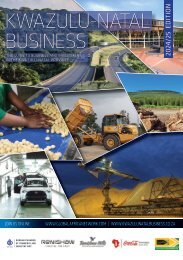KwaZulu-Natal Business 2016-17 edition
The 2016-17 edition of KwaZulu-Natal Business is the eighth issue of this highly successful publication that, since its launch in 2008, has established itself as the premier business and investment guide to the KwaZulu-Natal province in South Africa. The province is unique in terms of its abundant natural and human resources, and is also one of the key drivers behind the South African economy. To complement the extensive local, national and international distribution of the print edition of the magazine (15 000 copies), the full content can also be viewed online at www.kwazulunatalbusiness.co.za. Updated information on KwaZulu-Natal is also available through our monthly e-newsletter, which you can subscribe to online at www.globalafricanetwork.com, in addition to our other business-to-business titles that cover all nine provinces, complemented by our flagship publication, South African Business.
The 2016-17 edition of KwaZulu-Natal Business is the eighth issue of this highly successful publication that, since its launch in 2008, has established itself as the premier business and investment guide to the KwaZulu-Natal province in South Africa.
The province is unique in terms of its abundant natural and human resources, and is also one of the key drivers behind the South African economy.
To complement the extensive local, national and international distribution of the print edition of the magazine (15 000 copies), the full content can also be viewed online at www.kwazulunatalbusiness.co.za.
Updated information on KwaZulu-Natal is also available through our monthly e-newsletter, which you can subscribe to online at www.globalafricanetwork.com, in addition to our other business-to-business titles that cover all nine provinces, complemented by our flagship publication, South African Business.
You also want an ePaper? Increase the reach of your titles
YUMPU automatically turns print PDFs into web optimized ePapers that Google loves.
OVERVIEW<br />
Renewable energy<br />
Bio-mass is leading the way in <strong>KwaZulu</strong>-<strong>Natal</strong>.<br />
SECTOR HIGHLIGHTS<br />
Richards Bay is set to be a<br />
renewable energy hub.<br />
• St Lucia may get a wind<br />
farm.<br />
• Sugar cane is a good crop<br />
for feedstock for bio fuel.<br />
Massive wind farm projects are planned for St Lucia.<br />
South Africa has embarked on a very successful campaign to<br />
get private companies to provide power to the national grid<br />
using renewable resources such as wind, the sun and water<br />
power. <strong>KwaZulu</strong>-<strong>Natal</strong> has so far received only one of these<br />
licences, and is determined to catch up.<br />
Since 2011 dozens of projects, particularly solar and onshore wind<br />
projects, have been approved, adding more than 5 000MW to the potential<br />
of the national grid and bringing in investment worth more than<br />
R150-billion.<br />
The only project approved in <strong>KwaZulu</strong>-<strong>Natal</strong> as part of the Renewable<br />
Energy Independent Power Producer Programme (REIPPP) is a 16.5-megawatt<br />
(MW) bio-mass project which is to be built on the North Coast of<br />
<strong>KwaZulu</strong>-<strong>Natal</strong>.<br />
The huge forestry, timber, paper and pulp industries of the province<br />
carry with them the potential to provide feedstock for the renewable<br />
energy sector.<br />
Forestry waste, sugar cane and agricultural waste will provide the<br />
feedstock for a R2-billion facility that will largely supply the tenants of<br />
the Richards Bay Industrial Development Zone (RBIDZ) with power. The<br />
company Byromate, which has wind and solar projects elsewhere in<br />
South Africa, expects to start delivering power in 2018.<br />
The provincial government wants to see the RBIDZ become a hub for<br />
renewable energy, and this bio-mass project is expected to be just the<br />
first of many in solar power, wind and other types of renewable energy.<br />
<strong>KwaZulu</strong>-<strong>Natal</strong>'s most prevalent crops, sugar cane and sugar beet,<br />
are among the most efficient and cost-effective feedstock for the<br />
creation of biofuel. A R1.8-billion<br />
project is planned for the northern<br />
area of Makhathini. The Industrial<br />
Development Corporation (IDC) is<br />
the major investor in this scheme<br />
which is intended to produce<br />
72-million litres of ethanol and 34<br />
megawatts of electricity.<br />
Sugar grower and producer<br />
Tongaat-Hulett believes that the<br />
national sugar industry could<br />
generate between 700MW and<br />
900MW.<br />
An entrepreneur in the<br />
Midlands makes biodiesel from<br />
used oil. Darryl Melrose's company,<br />
Bio Diesel SA, produces 20 000<br />
litres of diesel every month.<br />
Although it is not part of the<br />
REIPPP, one of the country's biggest<br />
RE projects is in fact in <strong>KwaZulu</strong>-<br />
<strong>Natal</strong>: the Ingula pumped-storage<br />
scheme in the northern reaches<br />
of the province will generate<br />
1 332MW when the R16.6-billion<br />
facility is fully operational. This is<br />
a 'peak' power station that only<br />
comes into operation demand<br />
peaks: water is pumped to the upper<br />
reservoirs before it is released<br />
to create power as it falls to the<br />
KWAZULU-NATAL BUSINESS <strong>2016</strong>/<strong>17</strong><br />
88


















